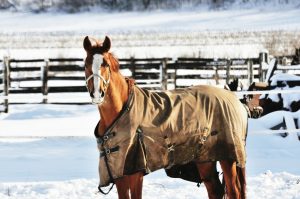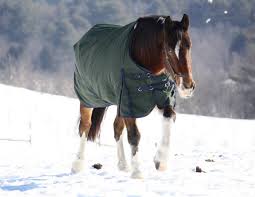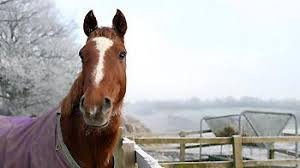Winter Horse Care Tips
As the days grow colder and the nights ever longer, your horse/s will require extra care here are some of our winter horse care tips. From food and water to shelter from the elements, a few small changes can make the world of difference to your four-legged friend.
 Ensure you’re ready for the winter months with our top tips on horse care during the coldest season, to keep you and your equine healthy and happy.
Ensure you’re ready for the winter months with our top tips on horse care during the coldest season, to keep you and your equine healthy and happy.
Feed modifications For Winter
Many horses will require more feed during the winter months. The reason is two-fold. Firstly, horses often use their fat reserves during winter to stay warm, and so require more energy to sustain them. Secondly, fibre digestion keeps horses’ bodies warm, so providing more forage means more fibre, which means more fibre digestion, which means a warmer, more comfortable horse.
During the winter the nutritional level in the grass is reduced, so you may want to consider providing a vitamin and mineral supplement to ensure your horse reaches his daily quota.
However, be careful not to overfeed your horse, which can easily be done. Keep a regular check on your horse’s weight to ensure he is not gaining, or losing, too much. If in doubt about feed quantities seek professional advice.
Winter Drinking Water
Increased hay consumption can lead to impaction if the horse isn’t drinking enough water, so it is paramount to check water troughs at least

twice a day to ensure that there is plenty of drinking water. As the temperatures plunge water can become frozen or covered with surface ice, making it impossible for it to be drunk. Remove any ice and break any surface water as soon as you find it.
Even if still in liquid form, the severe cold of the water may put your horse off. If you suspect your horse may not be drinking enough, mix some warm water into the trough to warm it up and make it more palatable. While a horse can’t indulge in a cup of tea, some warm drinking water may be the next best thing.
Shelter For Your Horse In Winter
A sturdy, three-sided shelter will help to keep your horse safe from the elements no matter what the weather throws at you. Trees and hedges can also provide natural shelter, but may not be as effective as a professionally-built structure.
Many breeds grow a long, thick coat during the winter that helps to keep them insulated. Don’t overgroom these unrugged horses as you may strip the coat of natural oils and reduce its waterproofing abilities.

Other breeds will require rugs, which should be selected on the basis of the current winter conditions. As winters become less severe, and rugs more insulating, a lighter rug might suffice now where a thicker rug was once needed. In any case, remove rugs at least once a day to check for sores, rubs or overheating.
Mud and Ice In Winter
The beautiful British weather can wreak havoc on a field open to the elements over winter. Fence off especially muddy or potentially icy areas, to avoid the risk of sinking and sliding. Regularly remove excess mud from your horse’s legs to avoid fungal and bacterial infections, and remove any ice chunks from hooves as walking on them is bad for horses’ tendons, ligaments and muscles.
Winter Livery
Are you are looking for a top place to keep your horse, did you know that Dallas Burston Polo Club offers livery?
What do you do to help your horse in winter if you do not have access to a stable block? What are your top tips? More advice can be found at BHS






